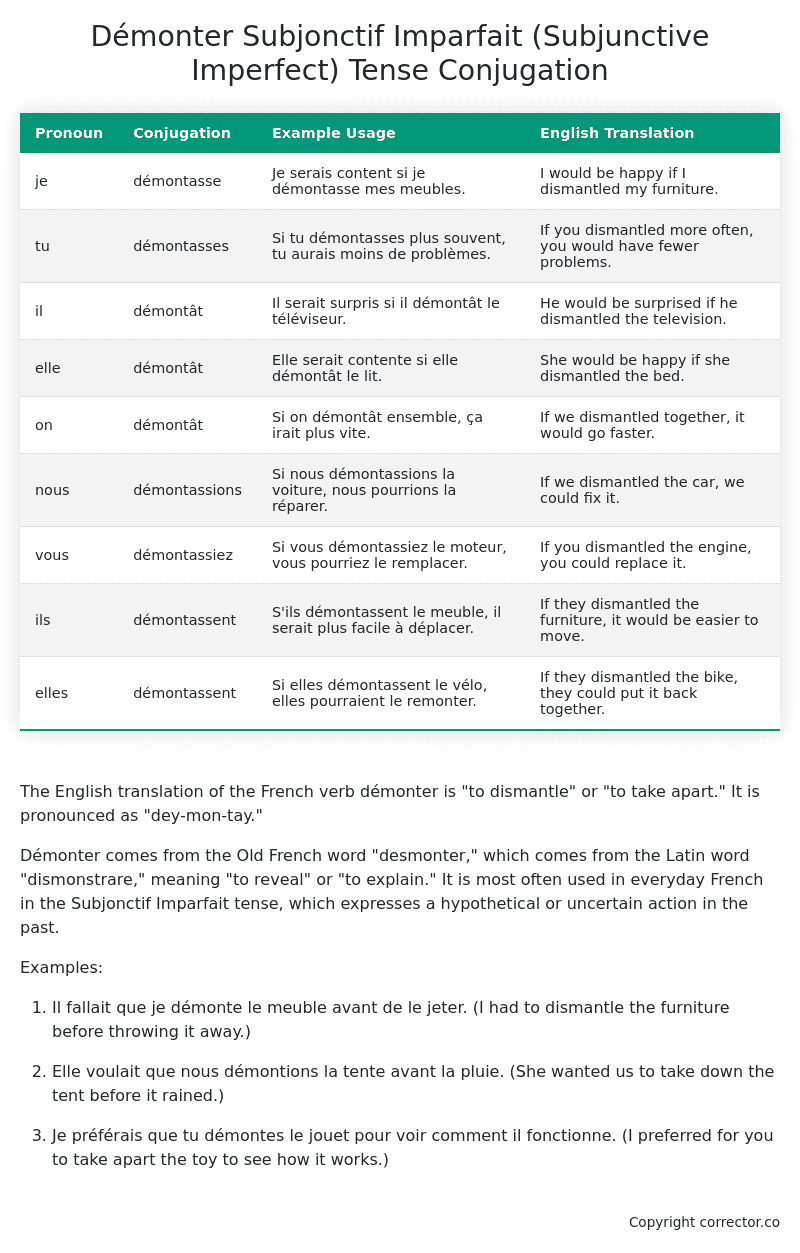Subjonctif Imparfait (Subjunctive Imperfect) Tense Conjugation of the French Verb démonter
Introduction to the verb démonter
The English translation of the French verb démonter is “to dismantle” or “to take apart.” It is pronounced as “dey-mon-tay.”
Démonter comes from the Old French word “desmonter,” which comes from the Latin word “dismonstrare,” meaning “to reveal” or “to explain.” It is most often used in everyday French in the Subjonctif Imparfait tense, which expresses a hypothetical or uncertain action in the past.
Examples:
-
Il fallait que je démonte le meuble avant de le jeter. (I had to dismantle the furniture before throwing it away.)
-
Elle voulait que nous démontions la tente avant la pluie. (She wanted us to take down the tent before it rained.)
-
Je préférais que tu démontes le jouet pour voir comment il fonctionne. (I preferred for you to take apart the toy to see how it works.)
Table of the Subjonctif Imparfait (Subjunctive Imperfect) Tense Conjugation of démonter
| Pronoun | Conjugation | Example Usage | English Translation |
|---|---|---|---|
| je | démontasse | Je serais content si je démontasse mes meubles. | I would be happy if I dismantled my furniture. |
| tu | démontasses | Si tu démontasses plus souvent, tu aurais moins de problèmes. | If you dismantled more often, you would have fewer problems. |
| il | démontât | Il serait surpris si il démontât le téléviseur. | He would be surprised if he dismantled the television. |
| elle | démontât | Elle serait contente si elle démontât le lit. | She would be happy if she dismantled the bed. |
| on | démontât | Si on démontât ensemble, ça irait plus vite. | If we dismantled together, it would go faster. |
| nous | démontassions | Si nous démontassions la voiture, nous pourrions la réparer. | If we dismantled the car, we could fix it. |
| vous | démontassiez | Si vous démontassiez le moteur, vous pourriez le remplacer. | If you dismantled the engine, you could replace it. |
| ils | démontassent | S’ils démontassent le meuble, il serait plus facile à déplacer. | If they dismantled the furniture, it would be easier to move. |
| elles | démontassent | Si elles démontassent le vélo, elles pourraient le remonter. | If they dismantled the bike, they could put it back together. |
Other Conjugations for Démonter.
Le Present (Present Tense) Conjugation of the French Verb démonter
Imparfait (Imperfect) Tense Conjugation of the French Verb démonter
Passé Simple (Simple Past) Tense Conjugation of the French Verb démonter
Passé Composé (Present Perfect) Tense Conjugation of the French Verb démonter
Futur Simple (Simple Future) Tense Conjugation of the French Verb démonter
Futur Proche (Near Future) Tense Conjugation of the French Verb démonter
Plus-que-parfait (Pluperfect) Tense Conjugation of the French Verb démonter
Passé Antérieur (Past Anterior) Tense Conjugation of the French Verb démonter
Futur Antérieur (Future Anterior) Tense Conjugation of the French Verb démonter
Subjonctif Présent (Subjunctive Present) Tense Conjugation of the French Verb démonter
Subjonctif Passé (Subjunctive Past) Tense Conjugation of the French Verb démonter
Subjonctif Imparfait (Subjunctive Imperfect) Tense Conjugation of the French Verb démonter (this article)
Subjonctif Plus-que-parfait (Subjunctive Pluperfect) Tense Conjugation of the French Verb démonter
Conditionnel Présent (Conditional Present) Tense Conjugation of the French Verb démonter
Conditionnel Passé (Conditional Past) Tense Conjugation of the French Verb démonter
L’impératif Présent (Imperative Present) Tense Conjugation of the French Verb démonter
L’infinitif Présent (Infinitive Present) Tense Conjugation of the French Verb démonter
Struggling with French verbs or the language in general? Why not use our free French Grammar Checker – no registration required!
Get a FREE Download Study Sheet of this Conjugation 🔥
Simply right click the image below, click “save image” and get your free reference for the démonter Subjonctif Imparfait tense conjugation!

Démonter – About the French Subjonctif Imparfait (Subjunctive Imperfect) Tense
Formation
Common Everyday Usage Patterns
Interactions with Other Tenses
Subjonctif Présent
Indicatif Passé Composé
Conditional
Conditional Perfect
Summary
I hope you enjoyed this article on the verb démonter. Still in a learning mood? Check out another TOTALLY random French verb conjugation!


